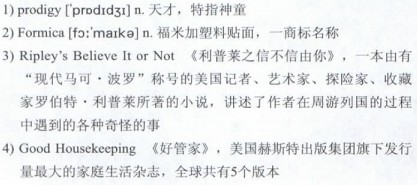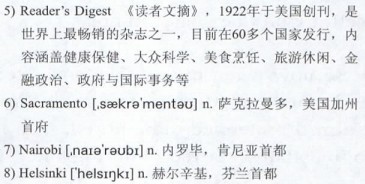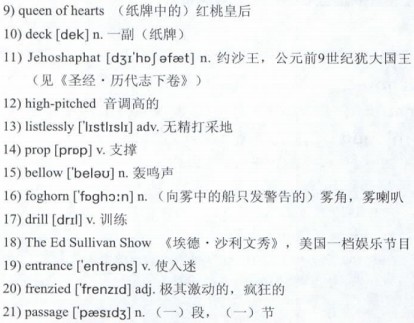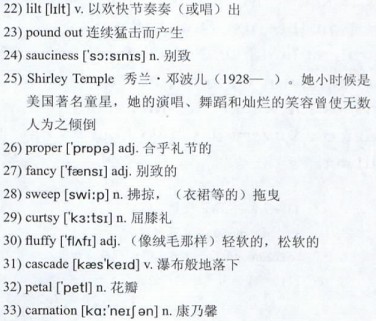本文作者Amy Tan(谭恩美)是一位著名的美籍华裔女作家,她于1952年在美国加州出生,曾就读医学院,后取得语言学硕士学位。她因处女作The Joy Luck Club(《喜福会》)而一举成名,成为当代美国的畅销作家,著有The Kitchen God’s Wife(《灶神之妻》)、The Bonesetter’s Daughter(《接骨师之女》)和The Hundred Secret Senses(《百种神秘感觉》)等小说,其作品多次获得文学界的重量级奖项,已被译成20多种文字,在世界各地广为流传。
本文选自小说Two Kinds的第一部分,在这部分内容中,作者通过讲述一些家庭小事反映出要强的母亲那“望女成凤”的急切心态。需要注意的是,由于作者的母亲说的大多是蹩脚英语,所以本文中有关作者母亲话语的引述都不大符合英文行文规范,此是作者特意为之。 ——Lavender
文字难度:★★★
My mother believed you could be anything you wanted to be in America. You could open a restaurant. You could work for the government and get good retirement. You could buy a house with almost no money down. You could become rich. You could become instantly famous.
“Of course, you can be a 1)prodigy, too,” my mother told me when I was nine. “You can be best anything.”
America was where all my mother’s hopes lay. She had come to San Francisco in 1949 after losing everything in China: her mother and father, her home, her first husband, and two daughters, twin baby girls. But she never looked back with regret. Things could get better in so many ways.
Every night after dinner my mother and I would sit at the 2)Formica-topped kitchen table. She would present new tests, taking her examples from stories of amazing children that she read in 3)Ripley’s Believe It or Not, 4)Good Housekeeping, 5)Reader’s Digest, or any of a dozen other magazines she kept in a pile in our bathroom. My mother got these magazines from people whose houses she cleaned. And since she cleaned many houses each week, we had a great assortment. She would look through them all, searching for stories about remarkable children.
我母亲相信,在美国,你可以随心所欲地成就任何事:你可以开一家餐厅;你可以为政府工作,然后获得一份丰厚的退休金;你可以几乎不花一分钱就买下一套房子;你可以变得富有;你可以一夜成名……
“当然,你也可以成为一个神童,”在我9岁那年,我母亲这样对我说道,“你可以在任何方面都是最优秀的。”
美国承载了我母亲所有的希望。在中国失去一切——父母、家、第一任丈夫、两个双胞胎女儿——之后,1949年,她来到了美国旧金山。但她从未带着遗憾回首往事。总有如此多的方式可以改善生活。
每天吃过晚饭后,我和母亲会坐在厨房里那张有福米加塑料贴面的餐桌旁。她会出些新的难题来考我,那些题都是她从她堆在我们浴室里的包括《利普莱之信不信由你》、《好管家》、《读者文摘》在内刊载了天才儿童事迹的杂志里看到并抽出来的。这些杂志都是我母亲从她提供清洁服务的人家那里得来的。由于她每周都会为许多人家清理房子,所以我们收集到一大堆各式各样的杂志。她会仔细地阅读所有杂志,在其中寻找有关天才儿童的故事。
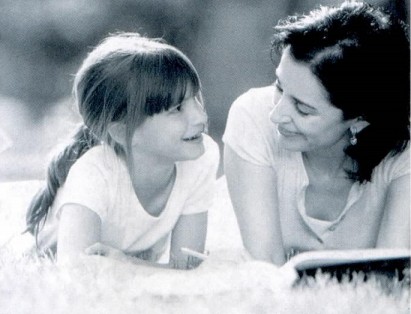
The first night she brought out a story about a three-year-old boy who knew the capitals of all the states and even most of the European countries. A teacher was quoted as saying that the little boy could also pronounce the names of the foreign cities correctly. “What’s the capital of Finland?” my mother asked me, looking at the story.
All I knew was the capital of California, because 6)Sacramento was the name of the street we lived on in Chinatown. “7)Nairobi!” I guessed, saying the most foreign word I could think of. She checked to see if that might be one way to pronounce 8)Helsinki before showing me the answer.
The tests got harder—multiplying numbers in my head, finding the 9)queen of hearts in a 10)deck of cards, trying to stand on my head without using my hands, predicting the daily temperatures in Los Angeles, New York, and London. One night I had to look at a page from the Bible for three minutes and then report everything I could remember. “Now 11)Jehoshaphat had riches and honor in abundance and...that’s all I remember, Ma,” I said.
And after seeing, once again, my mother’s disappointed face, something inside me began to die. I hated the tests, the raised hopes and failed expectations. Before going to bed that night I looked in the mirror above the bathroom sink, and I saw only my face staring back and, understanding that it would always be this ordinary face, I began to cry. Such a sad, ugly girl! I made12)high-pitched noises like a crazed animal, trying to scratch out the face in the mirror.
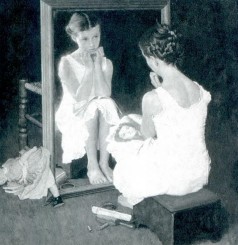 她第一晚给我讲的故事有关一个年仅3岁的男孩,他知晓各州的首府,甚至欧洲大多数国家的首都。文章还引用了一位教师的话,说那小男孩还能字正腔圆地讲出外国城市的名称。“芬兰的首都在哪儿?”母亲边看着那个故事边问我。
她第一晚给我讲的故事有关一个年仅3岁的男孩,他知晓各州的首府,甚至欧洲大多数国家的首都。文章还引用了一位教师的话,说那小男孩还能字正腔圆地讲出外国城市的名称。“芬兰的首都在哪儿?”母亲边看着那个故事边问我。
我只知道加州的首府——萨克拉曼多,因为在唐人街里,我们所住的这条街道用的就是这个名字。“内罗毕!”我猜道。这是我能想到的最具“异国情调”的词。在告诉我答案之前,母亲翻开字典查了一下“萨克拉曼多”是否是“赫尔辛基”的另一种发音。
题目变得越来越刁钻——乘法心算、从一副纸牌中抽出红桃皇后、试图不借助手就能倒立、预测洛杉矶、纽约和伦敦这些城市每天的气温。有一晚,她还拿《圣经》里的某一页让我看三分钟,然后要我说出能记住的内容。“现在,约沙王不仅享有荣华富贵,还备受尊敬,并且……妈妈,我只记住了这些。”我说道。
再一次看到母亲失望的脸孔后,我内心的某种东西开始消失。我憎恨那些考验,憎恶心中燃起的希望和最终被辜负的期许。那晚睡觉前,我对着浴室洗手池上方的镜子照了照,我只从镜面中看到自己的脸。意识到这永远都是一张再普通不过的脸时,我开始哭起来。我是一个多么悲伤而丑陋的女孩啊!我像一头发狂的小兽般尖叫起来,想要抓破镜中的那张脸。
And then I saw what seemed to be the prodigy side of me—a face I had never seen before. I looked at my reflection, blinking so that I could see more clearly. The girl staring back at me was angry, powerful. She and I were the same. I had new thoughts, willful thoughts—or rather, thoughts filled with lots of won’ts. I won’t let her change me, I promised myself. I won’t be what I’m not.
So now when my mother presented her tests, I performed 13)listlessly, my head 14)propped on one arm. I pretended to be bored. And I was. I got so bored that I started counting the 15)bellows of the 16)foghorns out on the bay while my mother 17)drilled me in other areas. At last she was beginning to give up hope.
Two or three months went by without any mention of my being a prodigy. And then one day my mother was watching 18)The Ed Sullivan Show on TV. She seemed 19)entranced by the music, a 20)frenzied little piano piece with a mesmerizing quality, which alternated between quick, playful 21)passages and teasing, 22)lilting ones.
“Look here,” my mother said, calling me over with hurried hand gestures.
然后,我似乎看到了自己怀有天赋的一面——我从未见过这样一张脸。我使劲眨眼,想更加清楚地看看镜中的自己。镜中的女孩也盯着我看,她愤怒而充满力量。我们是同一个人。我有了新的想法,任性的想法——或者说,充满“不”的想法。我向自己承诺,不会让她改变我。我要做回自己。
所以现在,当我母亲出题考我时,我表现出一副无精打采的样子,用手撑着头。我假装很厌烦。我确实很烦。当我母亲训练我其他方面的能力时,我烦到开始数屋外海湾上的雾角声。终于,她开始放弃寄托在我身上的希望。
两三个月过去了,这期间,她不再提起我可以成为神童这类事了。之后有一天,我母亲在电视上看《埃德·沙利文秀》。她似乎为节目里的音乐所着迷,那是一小段极具诱惑力且激昂的钢琴曲,节奏时而紧凑俏皮,时而轻快逗趣。
“快看,”我母亲边急匆匆地向我打手势,边叫唤我。
I could see why my mother was fascinated by the music. It was being 23)pounded out by a little Chinese girl, about nine years old. The girl had the 24)sauciness of a 25)Shirley Temple. She was proudly modest, like a 26)proper Chinese Child. And she also did a 27)fancy 28)sweep of a 29)curtsy, so that the 30)fluffy skirt of her white dress 31)cascaded to the floor like 32)petals of a large 33)carnation.
In spite of these warning signs, I wasn’t worried. Our family had no piano and we couldn’t afford to buy one, let alone 34)reams of 35)sheet music and piano lessons. So I could be generous in my comments when my mother 36)badmouthed the little girl on TV.
“Play note right, but doesn’t sound good!” my mother complained “No singing sound.”
“What are you 37)picking on her for?” I said carelessly. “She’s pretty good. Maybe she’s not the best, but she’s trying hard.” I knew almost immediately that I would be sorry I had said that.
“Just like you,” she said. “Not the best. Because you not trying.” She gave a little38)huff.
The little Chinese girl sat down to play an 39)encore of 40)Anitra’s Tanz, by Grieg. I remember the song, because later on I had to learn how to play it.
Three days after watching The Ed Sullivan Show my mother told me what my schedule would be for piano lessons and piano practice. She had talked to Mr. Chong, who lived on the first floor of our apartment building. Mr. Chong was a retired piano teacher, and my mother had traded housecleaning services for weekly lessons and a piano for me to practice on every day, two hours a day, from four until six.
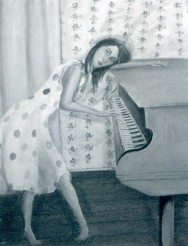 我明白母亲为那段音乐着迷的原因了。它是由一个大概9岁的中国小女孩弹奏的。那个女孩有着秀兰·邓波儿那样别致的脸孔。她不卑不亢,俨然一个举止端庄的中国儿童。她还行了一个体面的屈膝礼,她那质地柔软的白色礼裙垂到地板上,就像一朵巨大的康乃馨的片片花瓣。
我明白母亲为那段音乐着迷的原因了。它是由一个大概9岁的中国小女孩弹奏的。那个女孩有着秀兰·邓波儿那样别致的脸孔。她不卑不亢,俨然一个举止端庄的中国儿童。她还行了一个体面的屈膝礼,她那质地柔软的白色礼裙垂到地板上,就像一朵巨大的康乃馨的片片花瓣。
尽管这一切迹象都在发出警告,但我不担心。我们家没有钢琴,也买不起钢琴,更别提支付大量活页乐谱和钢琴课所需的费用。所以当我母亲批评电视上的那个小女孩时,我可以恣意表达自己的意见。
“键都按准了,但弹出来的音乐不好听!”我母亲抱怨说“不成歌韵”。
“你在挑剔她什么?”我不经心地说道,“她弹得很好。也许她不是最棒的,但她很努力。”我一张口就立刻知道自己说错话了。
“就像你一样,”她说道,“不是最好的。因为你没有努力。”她有些生气。
那个中国小女孩坐下来,再弹了一曲格里格的《阿尼特拉舞曲》。我记得那首曲子,因为后来我也得学习如何弹奏这首曲子。
看完《埃德·沙利文秀》三天后,母亲告诉我有关钢琴课以及钢琴练习的时间安排。她和住在我们公寓大楼一楼的钟先生谈好了。钟先生是个退了休的钢琴教师,我母亲给他打扫房子,以此来交换他每周给我上钢琴课,还有一架供我练习的钢琴,每天练两小时,从下午4点练到6点。
